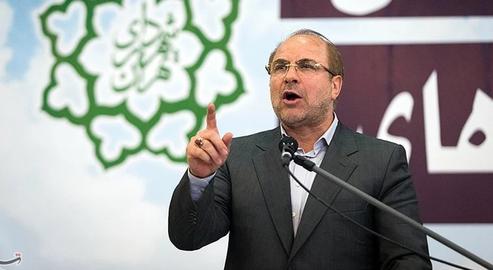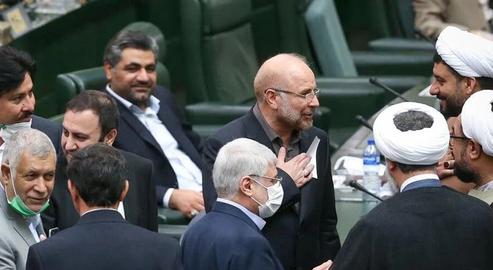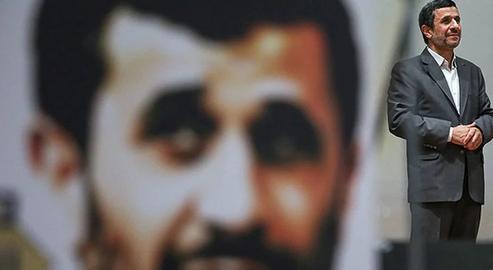Mohammad Baqher Ghalibaf is in a strange situation. He appears to have the upper hand as Speaker of the Iranian Parliament, and is regarded by many as a plausible candidate in this year’s presidential election. As a former IRGC commander, police chief, doctor, pilot and Mayor of Tehran, he ought to hold all the cards. And yet, he has never won.
Recently Ghalibaf has felt emboldened enough to issue directives on how the Iranian economy ought to be managed. In response, President Rouhani acerbically questioned the Iranian parliament’s ability to perform the most basic four mathematical calculations. But not to be dissuaded, just three days after this withering put-down, the Speaker made another public proclamation in which he bungled the logic again.
***
At a formal meeting of the representatives of Tehran Chamber of Commerce, Mohammed Bagher Ghalibaf, who once served as mayor of the Iranian capital himself, addressed those present on the subject of unfinished capital projects.
“On the one hand,” he said, “we abandon almost 100,000 semi-finished projects. On the other hand, we have liquidity in the bank. We must come up with a plan, and there are ways.
“If a person who has invested his money – be it a small sum or a large one – sees the economic benefits of this sector in production and transformation, he will naturally gravitate towards it, provided that what occurred in the stock market does not happen again, so as to ensure that the legal shareholders are the sellers at the peak and the buyers on the downturn.
“This cannot be managed artificially. The stock market is the most transparent of markets, in which real competition must take place. When banks are not allowed to do business and foreign capital is at a minimum, we use domestic capital in the worst possible way. Well, what do we do about this?”
It was not clear exactly what the Speaker of the Iranian Parliament was getting at. Does Ghalibaf think liquidity is readily-accessible money in the bank and it simply hasn’t occurred to anyone to inject it into half-finished projects before now?
Ghalibaf appears to be unaware that a large part of liquidity consists of the debts of the government and state-owned entities to the banks. These are in fact loans that have been paid for the implementation of development projects that themselves had no economic justification. Furthermore, it is not clear when and how they will be repaid. This is money that does not exist outside of banks' accounting offices.
Furthermore, what does Ghalibaf mean by not repeating what happened in the stock market? What does the stock exchange have to do with construction projects? Does he mean, perhaps, investment in developments such as Dehdasht Petrochemical, which is being floated on the stock market despite only having a "project under construction" sign at the door and several half-finished warehouses to its name? If this was a way forward, why has this project, which has been on the stock exchange since 2009, still not been completed?
Is Ghalibaf inviting people to go on a bank run, to withdraw their deposits “big and small”, as he puts it, and invest them instead in development projects through a stock-exchange-like-mechanism? The Iranian stock market is not in a stable position at present, and to send a new wave of stray money into an already-chaotic environment is hardly sage advice.
Questionable, too, was Ghalibaf’s mention of “legal” shares. It is unclear whether he meant that some shares are illegal, or that only legal entities – as opposed to illegal ones – should be the ones selling at the peak price and buying at the lowest price.
Ghalibaf appears to be unaware that many are taking note of these hallucinations. Despite his decorated CV, Ghalibaf is on the back-foot when presenting economic prescriptions. He is sitting in the wrong chair. In the past, he has strained to describe himself as a “jihadi manager” who works from 4am to 12pm. The nature of the work is, apparently, immaterial. He strives to position himself as an elephant, while the eminently-graspable logic of economics, even at the level of managing household expenditure, dictates that one think about the balance of income and payments at least in the medium term.
During his long tenure as Mayor of Tehran, Ghalibaf destroyed the already defective structure of the urban economy to such an extent that its effects may well last forever. He aggressively sold building density permits for 12 years and exhausted the economic and spatial capacities of the city. He imagines that he has built a two-story tunnel, a bridge and a highway for Tehran, without thinking about how the costs these projects bore might have solve Tehran's real infrastructural problems. Ghalibaf, of course, was lucky in that he left the municipality before the worst effects of this were felt, and left its legacy of economic, social and political turmoil to the reformists. A president may not be able to do so.
It would appear there is no one in Ghalibaf’s immediate circle who knows much about economics. If there were, they would have advised him not to maneuver too much on the 2021-22 budget. Next year -- even if the sanctions are lifted -- the Iranian economy will not be in a good position, and political reason at least dictates that he put the blame for this on Rouhani's government. But while he and other lawmakers are confidently ploughing the budget for their own ham-fisted ends, they are pouring water into a crisis mill that will surely impact on the next government, whoever it may be.
Related coverage:
The Corrupt Commander is the New Speaker of Parliament
Parliament Lets Tehran’s Mayor off the Hook in Corruption Scandal
Calls for Mayor’s Resignation After 30 Killed in Tehran High-Rise Disaster
visit the accountability section
In this section of Iran Wire, you can contact the officials and launch your campaign for various problems


























comments